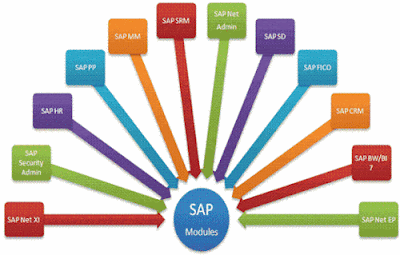What is SAP Software System?
What is ERP?
Before knowing about SAP it is better to understand the meaning of ERP. ERP stands for Enterprise Resource Planning. It focuses on the system for improving the efficiency of business processes where each department of the business process is integrated. Executives, Managers and Employees all enter data into the ERP system, creating a real-time, enterprise-wide snapshot. This allows departments to begin planning for any issues before they become a problem in that department. In short allows the business to focus on the data, instead of the operations.
What is SAP software system?
SAP is one of the providers of ERP software. Others include Oracle, Microsoft, Infor Orbis, and Epicor. It is a German multinational software company known for making enterprise resource planning (ERP) software. SAP software is used for allowing departments to begin planning for any issues before they become a problem in that department. In short allows the business to focus on the data, instead of the operations. It is a software system that stands for Systems, Applications and Products.Background of SAP
The product of five ex-IBM employees, SAP started in 1972 as a small software company in Germany with just one customer. Their first product was a modification of IBM's punch-card data storage, which stored data mechanically and required overnight processing. For their client, the German branch of Imperial Chemical Industries, SAP developed a real-time payroll and punch-card system in 1972.SAP Modules
SAP ERP is an obvious leader when it comes to neatly integrated ERP software. Beyond its basic models, SAP software provides industry-specific add-on solutions. It contains an enormous number of modules, and the main categories are:
Accounting
- Finance (FI)
- Investment Management (IM)
- Project Systems (PS)
- Controlling (CO)
- Enterprise Controlling (EC)
- Financial Supply Chain Management (FSCM)
Logistics
- Material Management (MM)
- Sales and Distribution (SD)
- Logistics Execution (LO)
- Warehouse Management (WM)
- Plant Maintenance (PM)
- Customer Service (CS)
- Fleet Management (FM)
- Quality Management (QM)
- Production planning (PP)
- Environment, Health, and Safety (EH&S)
Human Resources
- Organization Management (HR-OM)
- Personnel Management (HR-PM)
- Personnel Administration (HR-PA)
- Personnel Development (HR-PD)
- Personal Time Management (HR-PT)
- Payroll (HR-PY)
- Training and Event Management (HR-TE)
- Learning Solutions (HR-LSO)
- Compensation (HR-CM)
- Enterprise Compensation (HR-ECM)
- Benefits (HR-BN)
- Recruitment (HR-PB)
- Loan (HR-LN)
- Advance Business Application Programming (HR-ABAP)
Technology
- Cross-Application (CA), includes classification systems and workflow
- Basic Components (BC or BASIS)
- Programming (ABAP)
- Security and Authorizations
What is ASAP Methodology?
ASAP Methodology is a road map for efficient implementation of SAP system. It typically consists of the following phases- Project Preparation: Initial planning, setting of goals and timelines, and identifying team members
- Scope validation/ Business Blueprint: Includes an understanding of how the organization intends to use SAP for their business goals, including the identification of business process delta requirements and how SAP can provide solutions for current processes.
- Realization: After the identification of business delta requirements have been defined, this phase moves forward with the implementation of those requirements.
- Final Preparation: Generic Pre-completion activities, such as rehearsal and end-user training. Prepare to go live
- Go Live & Support: SAP modules go live with sustained support.
Market Share and Competitiveness:
According to Forbes SAP is a leader in ERP industry. SAP grew their share of the worldwide SCM market from 23.9% in 2013 to 25.8% in 2014. Oracle their closest rival, lost market share between 2013 and 2014, falling from 16% to 14.6%. The following graphic compares the top five vendors’ SCM and procurement software revenue market shares for 2014, followed by the original data table Gartner provided:
This has been a general overview of SAP ERP software, including the available modules, implementation methodology, and its market share. Hopefully this guide helps in understanding SAP as an accounting software, specifically, and as a complete business solution in general. For any queries regarding SAP feel free to contact us.






I must thank you for the efforts you have put in penning this site. I am hoping to check out the same high-grade content by you later on as well. In truth, your creative writing abilities has inspired me to get my own, personal blog now..
ReplyDeleteSAP Training in Chennai | SAP ABAP Training in Chennai